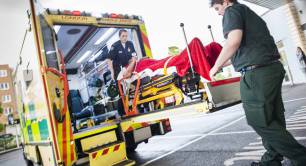NHS keen to use more social enterprises
The NHS has "a couple of hundred million" to spend on contracts that many more social enterprises could tender for. Neil Stewart, the head of procurement for NHS Highland would like to see more of them doing it.
Although it’s hard to make any story with the word procurement in the title sound sexy, the reason any social enterprise should be interested is a huge pot of cash available for the right service provider.
Social ventures at the Social Enterprise Summit were given the opportunity to show off their work to the head of procurement for NHS Highlands. Neil Stewart, who spoke at the summit, is responsible for contracts covering an area that is bigger than Belgium. Of the £700m NHS budget for the area, the majority goes on staff, but Stewart estimated “a couple of hundred million” goes on everything else. For him that means everything from document scanning to fire doors.
Stewart mentions a few regional social enterprises that he’s done business with in the past including New Start Highland (furniture reuse) and Highland Blindcraft, who employ visually impaired and disable people to make furniture. There’s also ILM, based near Inverness, who help people into sustainable employment. He was happy that social enterprises at the summit were sounding him out about work. While emphasising that the tendering of services has to be fair and transparent, Stewart said: “I would like to think that more of the money was spent locally supporting our community.”
There will soon be a real opportunity for social enterprises in the Highlands due to regulation changes. Although a cash strapped NHS will inevitably consider the bottom line, the Procurement Act that was passed in Scotland last year will insist on compliance with the "sustainable procurement duty". Before undertaking a regulated procurement exercise, authorities will have to make considering improvement of the economic, social and environmental wellbeing of an area a requirement. The Act will also facilitate the involvement of SMEs and third sector bodies, and promote innovation. Or as Stewart puts it, when considering a tender in the future he can take into account: “How that money can sustain communities.” Stewart’s department is expecting the guidance to be in place by August this year, with contracts available taking into account this consideration available from March 2016.
We discuss John Swinney’s speech at the summit, which backed social enterprises in the Highlands and Islands and agree that it didn’t just sound like lip service. Stewart has met with Swinney and describes him as being “very passionate about using the billions of pounds spent every year supporting the economy of Scotland. Particularly within the Highlands, where we have fragile rural areas where three or five jobs might sustain a community.”
There is already some legislation in place that supports social enterprises. In October 2012 Nicola Sturgeon welcomed a new national Framework Agreement that makes it easier for Scottish public bodies to buy from supported businesses. A supported business was defined as “an establishment where more than 50% of the workers are disabled persons who by reason of the nature or severity of their disability are unable to take up work in the open labour market”.
The kind of services currently available for procurement by the public sector furniture, document management, textiles and signage. Royal Strathclyde Blindcraft Industries, a similar organisation to Highland Blindcraft based in Glasgow, is listed on the Framework Agreement. Stewart is keen for more social ventures to be available there offering different types of products.
Although contract borders have been divided up so that, for example, Highland dairy farmers can supply milk locally, Stewart said “I’d like to see more Highland organisations on that because we want to try and make it as easy as possible to do business. There’s no need for fruit and veg or meat to be coming from Glasgow or Edinburgh because we have fantastic supplies of these things throughout the Highlands.”
With the support of the Deputy First Minister, the enthusiasm of people in influential positions such as Stewart and forthcoming legislation proving supportive, there will be real opportunities for social enterprises in the highlands and islands in the very near future.
Photo credit: Tim Winterburn



